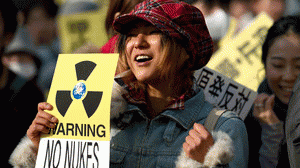The German Parliament voted last week to phase-out nuclear power by 2022. Thus far lacking a legislative commitment, Prime Minister Naoto Kan says even resource-poor Japan should wean itself from nuclear power. Seventy percent of Japanese parliamentarians agree with him. What is it about World War II's losers and atomic electricity?
Predictable responses to the latest and possibly worst civil disaster of the Nuclear Age? The final victory for (surging) anti-nuke movements? I don't think so. There's more happening here. No Japanese government has ever been accused of over attentiveness to public preferences. Instead, they may know something the war's victors do not.
Legal proceedings against the notorious Nazi Doctors brought us the Nuremburg Code. (Japanese "scientists" were granted immunity by General MacArthur in exchange for their biowar research). It comprises ten directives for "human experimentation."
The Nuremburg Code did not prevent a host of horrific postwar human experiments, including radiological studies, in Sweden, the UK, the US, and elsewhere. But it did lead, decades later, to widespread adoption of notions of "informed consent," the development of institutional review boards, and other ethical and practical constraints on reckless research.
Nuclear power and the Bomb from which it derived are human experimentation, literally and figuratively. Countless rushed experiments were necessary to complete the Manhattan Project. An explosion tested the first Bomb in the New Mexican desert; within weeks, Hiroshima and Nagasaki became radioactive laboratories (and sarcophagi).
Over the next eighteen years hundreds of additional atomic explosions in the Nevada desert, the Soviet Arctic, the Kazakh steppe, the Algerian Sahara, French Polynesia, and on "American" atolls in the South Pacific enabled the development of the hydrogen bomb and sundry innovations. The Partial Test Ban Treaty (1963) drove nuclear testing underground for Britain, the US, and the USSR. Not party to the treaty, France continued atmospheric testing on Pacific islands, finally ending all tests in 1996.
No one knows the number of victims of nuclear weapons manufacture, testing and its detritus, as these experiments had no control groups. The American list includes Navajo uranium miners, soldiers, Utah sheep farmers, and residents around places like Rocky Flats, Colorado and Colonie, New York. Some New Mexicans likely got a fresh dose following the recent wildfire that torched the countryside surrounding Los Alamos National Laboratory, site of hundreds of tons of sloppily buried nuclear waste.
There is also uncertainty, and controversy, over the number of victims of civilian nuclear power. Estimates from anti-nuclear activists Helen Caldicott and Harvey Wasserman vary by several orders of magnitude from estimates by the Nuclear Regulatory Commission (NRC) and the Department of Energy. The reported death toll from Chernobyl starts at a few dozen and rises to nearly one million. We do know that the Chernobyl reactor released four hundred times more radioactive material than the bomb that destroyed Hiroshima. Similar disagreements still fog public understanding of the health effects of the Three Mile Island disaster.
Now there's Fukushima, our ongoing nuclear nightmare. It's a case study in corporate and government malfeasance, a bountiful feast for citizens concerned about transparency, prevarication, human and ecosystem health. One might think that the catastrophe would've led to a universal rush for the nuclear exits.
Instead, following an exceedingly brief period of safety protocol review, the forces pressing for a nuclear renaissance press on, especially in the land of the General Electric Mark I reactor: the United States.
How to think clearly about all this? That's where the Nuremburg Code comes in. Were countries employing nuclear power held to its directives as are social and medical scientists, we'd likely see a quick retreat from the nuclear brink.
Applying the Code
The text of the Code, edited for brevity, comes from Trials of War Criminals before the Nuremberg Military Tribunals under Control Council Law, No. 10, Vol. 2 (Washington: U.S. Government Printing Office, 1949), pp. 181-182. It is available online at http://ohsr.od.nih.gov/guidelines/nuremberg.html
1. The voluntary consent of the human subject is absolutely essential.
The human subject here is every single one of us, everywhere, but especially, in the American case, the hundred million who live near 104 operating nuclear reactors in the US.
Voluntary consent, which morphed into informed consent, prohibits "any element of force, fraud, deceit, duress, over-reaching, or other ulterior form of constraint or coercion." Familiar with the story of the doomed Shoreham reactor? Follow the Vermont Yankee case? Does the term "tritium leak" ring a bell? Remember claims from the fifties that atomic electricity would be "too cheap to meter?" Do you consent to the NRC's lowering safety standards when industry fails to meet them?
(Note: You can view every article as one long page if you sign up as an Advocate Member, or higher).






